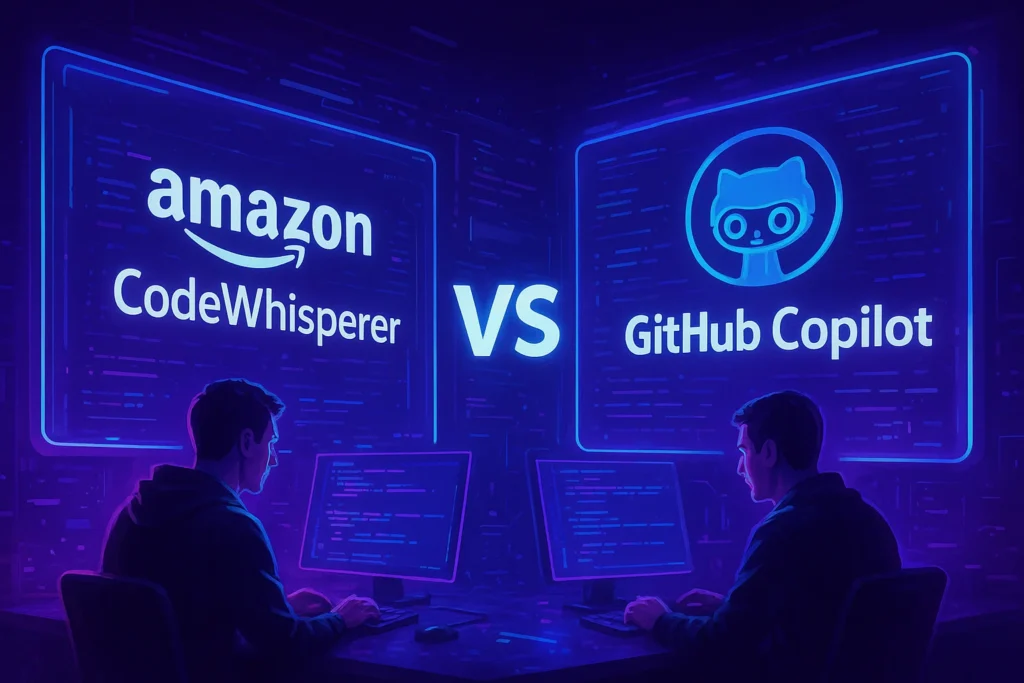Introduction
Imagine this: you start your day by opening your IDE, hitting “Enter,” and instead of wrestling with boilerplate or hunting through Stack Overflow, your assistant suggests a full, context-aware snippet, refactors a module, even flags a potential security issue—all in real time. That’s the promise behind tools like Amazon CodeWhisperer (now evolved into AWS’s “Q” suite) and GitHub Copilot. Today, we’re diving deep into Amazon CodeWhisperer vs GitHub Copilot in 2025, comparing their strengths, limitations, and where they really shine—or don’t.
I’ve used both in diverse settings (from solo prototype builds to team multi-module projects) and looked through the latest research, reviews and platform announcements to provide a fresh perspective—not just marketing hype. So whether you’re a solo freelancer, a startup dev-team lead, or part of an enterprise engineering org, you’ll get actionable insight on which tool might serve you better this year.
Background: What are they?
GitHub Copilot
Launched in collaboration between GitHub and OpenAI, Copilot was one of the first mainstream AI-coding assistants: it suggests code as you type, turns comments into implementations, handles boilerplate. Reviews in 2025 highlight that it accelerates coding especially on well-structured stacks. Graphite.dev
A recent update: in April 2025, GitHub announced Code Review capability—Copilot can review code, find bugs, suggest fixes.
Read Also: GitHub Copilot Pricing Explained (2025): A Complete Guide to All Tiers
Amazon CodeWhisperer → Amazon Q Developer
Originally released by Amazon Web Services as CodeWhisperer (general availability announced in April 2023) Amazon Web Services, Inc.+2Amazon Web Services, Inc.+2, the tool has since been folded into a broader offering called Amazon Q Developer (as of April 2024) which expands the scope beyond pure code suggestion: cloud-resource chat, autonomous agents, refactoring support. AWS Documentation+1
The transition means that when you’re comparing “CodeWhisperer” in 2025 it’s effectively the same underlying tech but inside the Q Developer ecosystem.
Comparison: Amazon CodeWhisperer vs GitHub Copilot
Let’s break this down across multiple axes.
| Feature | GitHub Copilot | Amazon CodeWhisperer (via Amazon Q Developer) |
|---|---|---|
| IDE / Ecosystem Integration | Strong integration with GitHub repos, VS Code, and GitHub ecosystem workflows. | Deep integration within AWS ecosystem (SDKs, cloud-infra context) plus standard IDE support. |
| Language & Stack Support | Very solid for mainstream languages (Python, JavaScript, TypeScript). Slightly weaker for niche or embedded code. | Good support for standard languages; particularly optimized when working with AWS services/infrastructure. |
| Advanced Features | Code review, conversational chat, agent modes being rolled out (though some criticism of agent maturity) | Code suggestions + security scans + cloud chat + code-transform and refactor agents (via Q Developer) |
| Data Privacy / Enterprise Controls | Offers business tiers with seat management, some controls around data but fewer enterprise-specific indemnities publicly mentioned. | Stronger orientation toward enterprise compliance (HIPAA, PCI, ISO) when running on AWS — especially for AWS-native stacks. |
| Pricing & Accessibility | Established pricing; widely used. | Free tier available; paid tier (Q Developer Pro) starts ~$19/user/month in 2025. |
| Real-world performance (developer experience) | Reviewers report measurable time savings but still require oversight and don’t eliminate human review. | Review commentary suggests that for AWS-centric workflows, CodeWhisperer/Q Developer can add value especially in infra/SDK tasks. |
Key Insights from Experience & Research
Here are some deeper, less obvious takeaways from working with these tools and digging into current reviews.
1. Context matters more than feature list
When I used Copilot in a small personal web-app (React+Node), it nailed boilerplate and wiring up web routes so much faster that I felt productive right away. But when I shifted to a large legacy monolith (multi-module Java+Spring+in-house libs), its suggestions were less helpful — the tool seemed unsure of project context and generated code needed heavy editing. This matches a reviewer’s observation:
“Copilot (as of March 2025) … can’t be trusted with a bit complicated task involving several files at the same time.” Medium
On the other hand, when working in an AWS-heavy environment, using CodeWhisperer (later Q Developer) felt smoother: it understood AWS constructs (Lambdas, SDK calls) and flagged relevant security/licensing issues. In that scenario, investing in the AWS-centric assistant paid off.
Takeaway: If you’re working in a general codebase (non-cloud-specific), Copilot gives high value. If you’re deep in AWS land, CodeWhisperer/Q Developer may pull ahead.
2. The “one-size fits all” myth
Both platforms still require developer oversight. I found that accepting suggestions blindly is risky: the code might compile but violate business logic, performance constraints or even licensing. For example, Copilot’s suggestions may “look good” but comment threads highlight that for niche libraries or embedded systems, accuracy drops. Intellias
In my practice, I used the AI assistant to generate a first draft of a module—but then had to manually review and refactor heavily. So “AI assistant” ≠ “autonomous coder.” Metadata from reviews supports this. hackr.io
3. Security, compliance and enterprise scale matter
For a startup or solo developer, the free/cheap tier is fine. But when you scale into teams with legacy code, multiple modules, regulatory constraints — then enterprise features become differentiators.
In this regard, CodeWhisperer/Q Developer have an edge if your stack lives on AWS and you want tight control. The external review (via Superblocks article) lists compliance features, usage analytics, and licensing control for Q Developer. Superblocks
For general-purpose development, Copilot is still very strong — but if you require guaranteed indemnities, enterprise governance, or full enterprise-grade controls, you’ll need to compare the business plans deeply.
4. Ecosystem lock-in & future-proofing
Another dimension: what ecosystem are you embedded in? If you live in GitHub, VS Code, open-source first workflows, Copilot is more native. If you’re locked into AWS (CloudFormation, CDK, Serverless, AWS SDKs) then CodeWhisperer/Q Developer plays to your strengths.
My experience: migrating code from one ecosystem to another was painful with AI suggestions because context (libraries, conventions) change. So, picking a tool aligned with your stack matters more than picking “best overall.”
5. Pricing vs value trade-off
It’s tempting to pick the cheapest or “free” option—but value resides in how much time you save and how much risk you mitigate. In one experiment a firm using Copilot reported ~30–40 % reduction in development time on certain modules. Metadesign Solutions
But if you pay for an enterprise tier and don’t leverage the enterprise features (governance, refactor agents), you may not see ROI. On CodeWhisperer’s side, the free tier is generous for small uses but the paid tier (Q Developer Pro) is priced around ~$19/user/month. Superblocks
Final Verdict: Which wins in 2025?
If you want a simple short answer:
- For general purpose, multi-stack, open-source-ish workflows, GitHub Copilot wins due to maturity, ecosystem fit, and wide language support.
- For AWS-centric, enterprise-scale development, Amazon CodeWhisperer (as part of Amazon Q Developer) wins due to deeper cloud context, enterprise controls, and AWS-specific value.
But there’s no blanket “winner.” The real answer is: match the tool to your workflow and stack. Below are some scenarios:
- Solo developer building a web app: Copilot gives faster ramp-up and covers most needs.
- Team working in AWS, heavy infra/SDK usage, need governance: CodeWhisperer/Q Developer is better aligned.
- Mixed stack, cloud-agnostic, multi-repo, diverse languages: Lean toward Copilot, but evaluate cost/licensing carefully.
- You’re experimenting, prototyping, want cheapest option: Try both free tiers and pick the one that “just feels right” for your codebase.
Best Practice Tips Before You Choose
- Try both: Use the free trial of each in your regular workflow for a week; see which suggestions you accept more, which feel less noise.
- Measure time saved: Track how many hours you spend on boilerplate/manual wiring vs letting the tool generate it.
- Govern with caution: Even when using AI assistants, keep human review in the loop.
- Read the terms: Especially around licensing, rights to generated code, how your code may be used in model training.
- Keep your codebase clean: A clean, well-structured codebase yields better suggestions from AI. If your code is messy, both tools struggle.
- Stay alert: AI coding tools evolve fast. Features like “agent mode” or “refactor multi-module” are emerging but not always mature (especially with Copilot agent mode criticisms). Medium
Final Thoughts about Amazon CodeWhisperer vs GitHub Copilot
In the evolving landscape of developer tools, the debate is no longer about if you should adopt an AI-coding assistant—it’s about which one fits your workflow best. In the Amazon CodeWhisperer vs GitHub Copilot showdown of 2025, there’s no one-size-fits-all winner—but you can pick a clear winner for you. Decide based on your stack, your team size, your compliance needs, and your workflow.
FAQ: Amazon CodeWhisperer vs GitHub Copilot
1. Which AI coding assistant is better for beginners?
If you’re just starting out, GitHub Copilot is easier to set up and use. It integrates seamlessly with VS Code and GitHub, offering intuitive inline suggestions that help new developers learn patterns faster.
2. Is Amazon CodeWhisperer free to use?
Yes, CodeWhisperer (within Amazon Q Developer) has a free tier suitable for individual use. However, the Pro tier—aimed at teams and enterprises—costs around $19 per user per month in 2025.
3. Can these AI tools replace human developers?
Not yet. Both tools can speed up repetitive tasks and suggest high‑quality snippets, but they still require human judgment for logic, architecture, and business rules.
4. Which AI assistant works best for cloud development?
Amazon CodeWhisperer/Q Developer excels in cloud environments, especially for AWS infrastructure, Lambda functions, and SDK integrations. Copilot, while versatile, isn’t as optimized for cloud‑native tasks.
5. What’s the future of AI coding assistants beyond 2025?
Expect deeper integration with IDEs, real‑time code reviews, and even AI agents that can refactor or document code autonomously. Both GitHub and AWS are actively building toward this “autonomous coding partner” vision.
Your step to choose Amazon CodeWhisperer vs GitHub Copilot
Try both tools side by side—pick a small project you’re comfortable with, use Copilot and CodeWhisperer (Q Developer) each for a week, and measure how much time you save and how many suggestions you accept. Then share your findings—either in the comments below, or on your dev-team’s forum. Want deeper workflow templates or comparison checklists tailored for startup vs enterprise? Let me know—I can draft one for you.



Amazon CodeWhisperer vs GitHub Copilot – Which AI Tool Wins?
afrwyyetlm
frwyyetlm http://www.g7259l1cjbt8nzs1flc07v34aq848f68s.org/
[url=http://www.g7259l1cjbt8nzs1flc07v34aq848f68s.org/]ufrwyyetlm[/url]
Your point of view caught my eye and was very interesting. Thanks. I have a question for you. https://accounts.binance.com/ro/register?ref=HX1JLA6Z